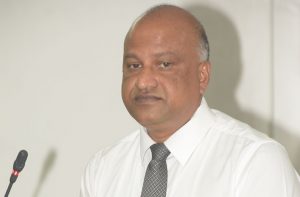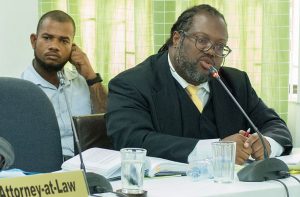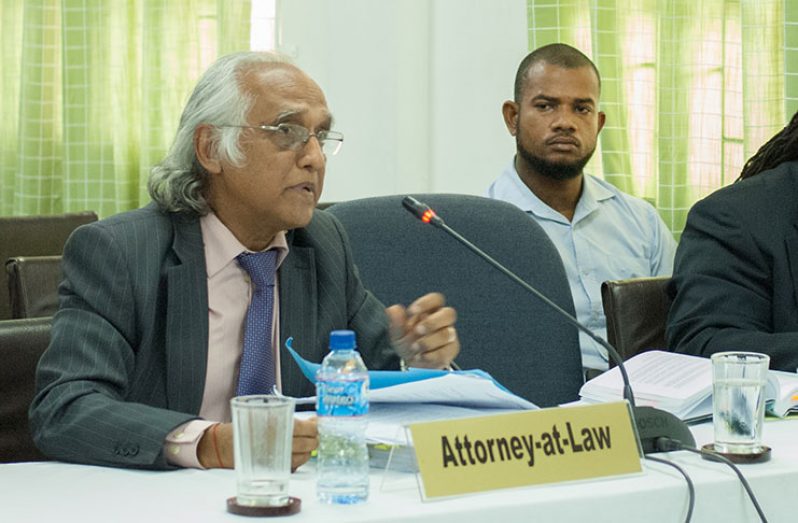ATTORNEY Selwyn Pieters on Friday accused the Guyana Police Force (GPF) of deliberately trying to minimise the evidence that would support claims made by Andriff Gillard, the man who said he was offered $7M to kill President David Granger.
In March, Gillard told detectives that he was offered $7M to assassinate President Granger by his former friend, Nizam Khan, in June 2015. No charges were laid on either the accused or the accuser as evidence presented to the Police Legal Advisor (PLA), Justice Claudette Singh proved tenuous.
Pieters contends that the interference by Police Commissioner, Seelall Persaud, in the investigations while he was on annual leave represented an obstruction of justice and noted that Persaud as the head of the institution ought to have treated the matter with much more seriousness.
He told the Commission that his client, television journalist, Travis Chase, had presented a copy of an interview done with Gillard on the matter to the Head of the Special Organised Crime Unit (SOCU), Sydney James, who then forwarded same to the hierarchy of the Guyana Police Force (GPF). Persaud was on leave on March 29, when the police became involved in the matter, but resumed duty on April 3. Upon his resumption, the Top Cop said he did not review the tape provided by Travis Chase and said he was not aware of the tape, and did not review the file relative to the matter before sending a briefing note to the President on the subject.
Minimise evidence
“It is our submission that the evidence produced during the CoI clearly presents a course of calculated, coordinated, and deliberate conduct to minimise the evidence that would support any claims made by Gillard, and enhance any claims made by Khan that the report of the complainant was false or fabricated.” The attorney called on Commissioner, Paul Slowe, retired Assistant Police Commissioner (APC), to reject the submissions that the police approached the case objectively. Pieters argued that it is a first principle of police officers to take proper notes, but in the current case the Commissioner failed to take any notes, and for that reason, there were large gaps in his memory and his evidence proved unreliable.

“His pocket book should have been his first method of recording the investigation, arrest and other significant events…but the fact that he made no note means they were calculated and deliberate on the part of Mr Persaud…because he is a very trained investigator and a very experienced investigator trained by the FBI, so his omission to make contemporaneous notes of an important event cannot be dismissed as something that isn’t significant …it is very significant,” said the attorney who believes Persaud neglected his duty.
He noted however, that the issue of note-taking or lack thereof, was ventilated throughout all the ranks who testified and suggested that emphasis be placed on the subject. In rebutting the suggestion by the Attorney representing the Police Force, Ian Chang, that because acting Top Cop, David Ramnarine, was not sworn in pursuant to the Constitution, the commissioner has superintendence over the force, Pieters said the fact is when the Commissioner goes on leave and Ramnarine acts, regardless of whether Ramnarine is sworn in, he is an agent of the Commissioner of Police and assumes all the offices of the Commissioner.
“If the Commissioner puts himself back on duty, which is what he did, that created a problem…he was on leave, he had no liability for anything that occurred on the 29th March to April 2nd, but when he puts himself back on duty, which he did on the 29th, that created serious problems which you will need to determine what the sanctions or course of actions will be.”
The Canada-based attorney stressed that the substantive Commissioner of Police interfered with the Major Crime Unit investigation. “We are saying that he did that when he spoke to Inspector Narine and he told the Commission that the culture of the Force is for subordinates to act on the suggestion of superiors.”
Persaud had told the Commission that he called Inspector, Prem Narine, of the Major Crime Unit and suggested that his friend, Imran Khan, brother of accused plotter, Nizam Khan, be released on his own recognisance as he did not have $10,000 for station bail. Persaud told the Commission that he did not instruct the Inspector to so act but noted that juniors would take the suggestions of their seniors as an instruction. “His instruction to Narine was improper and it also was done because of his relationship to Imran Khan…in other jurisdictions quite frankly, a Commissioner of Police who is on leave and who knows somebody very well…he would have been arrested for obstruction of justice,” declared the attorney who noted Persaud brought the administration of justice into disrepute.
Pieters urged the Commissioner to take seriously the conflict of interest he said exists. “People must know that when there is an offence that is reported to the police, somebody mustn’t have a friend in high places they could call and derail investigations…that’s what you had in this case…because he involved himself in this case there became tunnel vision.”
Problematic
The lawyer said the Commissioner acted in a personal capacity and that proved problematic. “…he said he guaranteed Inspector Narine by showing up to the police station…that means he put himself in the place of a surety and that’s not the role of a police commissioner…no police officer can do that.”

Pieters suggested that because Persaud is on the verge of retirement he may “feel he no longer needs the public confidence” and as a result acted negligently. The lawyer pointed to the non-submission of critical documents to the Commission that lawyers were privy to. In the case of Ramnarine, Pieters said he was aware of the relationship between Persaud and Imran Khan and failed to report same to his superiors. The relationship between Ramnarine and Persaud was brought under the microscope and according to Pieters “goes to a severe dysfunction in the Guyana Police Force and that is not to be taken lightly.”
“He (Persaud) granted the man no professional courtesy between March 29 to April 2nd…he is calling all the persons below Ramnarine but does not call Ramnarine…you cannot look at that very lightly…the GPF cannot afford to be run like that where you have a Commissioner of Police not speaking to the second in command on very important issues,” stated Pieters who noted that Gillard cannot be faulted for thinking the police was trying to cover up the matter.
Small role
Meanwhile, attorney representing Imran Khan, Christopher Ram, in his submission said his client played a small but not very significant role in this enquiry. He sought to discredit the allegation leveled by Gillard. “I think that guy needs help…Mr Gillard has some serious, serious problems…we have heard of financial problems, personal problems, police problems to an extent he could not recall the number of serious brushes he has had with the law enforcement agency…” said Ram.
He contended that his client was able to show that Gillard had a motive and concocted the allegation against his younger brother. “It is clear that Mr Gillard has been totally dishonest with the CoI…maybe he needs psychological help.” “Of all the witnesses who testified, no one has corroborated …nothing to support the fictitious evidence of Mr Gillard…he could not even recall as close a date of this alleged serious allegation,” said Ram who added “it makes a good folklore, it doesn’t make good facts…it is farthest from fact for even the most creative or fertile minds.”
The attorney refuted that his client was the recipient of special treatment because of his friendship with the Commissioner of Police. At the conclusion of Friday’s summation, Commissioner Slowe told all attorneys of his intention to take every bit of submission and evidence into account. He noted that it would not be an easy task but will endeavor to analyse all the evidence. “Maybe it is fortunate or not that I have some experience in the way things should be done in the Force,” he said, noting that the report of the CoI has to be submitted to President Granger at the end of the month. The Commission was initially required to submit its report on Friday but an extension of time was requested and granted.












